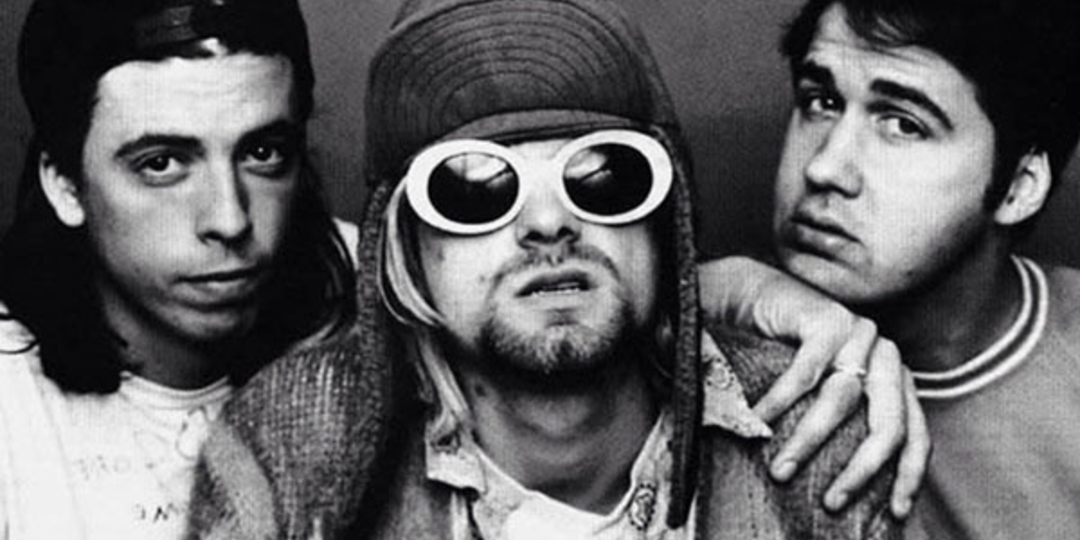
Nirvana sought to restore their indie cred after the massive success of their sophomore album Nevermind with In Utero, produced by Steve Albini and designed to bring them back closer to their acoustic roots.
Cobain, Grohl and Novoselic had long combined punk rock ethos with pop hooks in their songs; with In Utero they took these elements to the extreme.
Nirvana In Utero: A Death in the Making
Once Nevermind made Nirvana an international phenomenon, they quickly needed a follow-up. Producer Steve Albini was hired in order to help focus their songwriting – although this reportedly resulted in their label claiming that In Utero was unlistenable and they ended up producing an intensely challenging album that still resonates today.
The album was released in February 1994, less than two years after Cobain married Love and gave her Frances Bean, his only child with Love. But his life wasn’t going so smoothly: he began dabbling again with heroin use while his and Love’s issues with LA child protective services persisted even after they won back custody of Frances.
On April 10, Cobain took an overdose, which was not publicized at the time, yet revealed much about his personal problems and fame’s toll. His death sent shockwaves through society; even now its effects can still be felt daily. Unfortunately, many view In Utero solely as a kind of suicide note while missing its emotional depth and subtle humor; its true value lies in showing success on one’s own terms was possible and this alone should be celebrated as an incredible feat.
Nirvana In Utero: Success on Their Own Terms
Steve Albini’s production on In Utero provided Kurt Cobain and Krist Novoselic with the opportunity to remove any layers that veiled Nirvana’s sound, leading to it eventually becoming their first No 1 album after 1991’s breakthrough major label debut, Nevermind. Despite many obstacles, however, In Utero eventually became Nirvana’s second No 1 after Nevermind had become their debut major label release.
Even though In Utero has earned itself a reputation as an emotional farewell note, its depth and humor should not be overlooked when discussing its meaning today. From “Serve The Servants” to the bittersweet closing strains of “All Apologies”, In Utero contains songs that demonstrate a band at its peak struggling with becoming the generational spokesband they hadn’t anticipated until this point in time.
At its 30th anniversary, this album will be reissued in multiple formats – an 8LP super deluxe box set and 5CD box each featuring 53 previously unreleased live tracks taken from two full In Utero tour shows – Los Angeles in 1993 and Seattle before Cobain died in 1994 – recorded live from stereo soundboard tapes by Jack Endino of Bleach producer Jack Endino and assembled from stereo soundboard tapes by Bob Weston; 12 studio tracks have also been remastered while five bonus B-sides plus two cover songs from that tour (Vaselines – “Jesus Don’t Want Me for A Sunbeam” by The Vaselines) completes this monumental release!
Nirvana In Utero: A Suicide Note?
Some might view Kurt Cobain’s death less than eight months after the release of In Utero as intentional suicide; but that wasn’t the case. While not as monumental and culture-changing as Nevermind, In Utero stands as an intimate rebellious musical statement from Nirvana that deserves special recognition within rock canon. On Oct 27th there will be various formats released of its 30th anniversary edition including an 8LP super deluxe box set, 5CD super deluxe box set, 2LP + 10″ edition as well as digital super deluxe edition with 53 previously unreleased live tracks included!
While In Utero built on the success of Nevermind, it also brought it to its limits. Cobain, Grohl and Novoselic fused punk rock with pop hooks to craft an innovative sound.
Utero’s unconventional songwriting and production approach was an indicator that the band was ready to venture beyond their comfort zone, with Grohl’s drumming becoming more intense and Cobain’s vocals becoming rawer and distorted than ever before.
Producer Steve Albini recalls how Cobain utilized an affordable guitar from a pawn shop and an amp from Fender Quad Reverb to achieve the strained and distorted sounds heard on In Utero. Cobain claimed this sound was deliberately rough – not necessarily meant as an expression of suicide – yet still managed to produce many songs on that album.
Nirvana In Utero: Success on Its Own Terms
Once Nirvana had become an international phenomenon with Nevermind, Kurt Cobain and Krist Novoselic set about creating their follow-up record: In Utero. Working alongside producer Steve Albini they sought to craft an indie rock record that could distance itself from its audience while keeping Nirvana relevant.
The result was an explosive collection that cemented the band’s signature blend of shimmering, urgent pop songwriting (“Heart-Shaped Box,” “Pennyroyal Tea”) and scorched earth punk (“Pennyroyal Tea”). But it also read like a suicide note with Cobain’s dark lyrics set against Albini’s uncompromising production style.
Geffen/UMe will mark 30 years since In Utero first came out by reissuing it in several formats on October 27, including an 8LP Super Deluxe edition, 5CD Super Deluxe edition, 2CD deluxe edition and an 1LP + 10″ vinyl edition. These configurations were all remastered from original analog master stereo tapes sourced by Bob Weston during Albini’s sessions – both full concerts were recorded live in Los Angeles and Seattle and contain six additional bonus live tracks recorded at Springfield Rome New York and Seattle.
Included with this edition are five B-sides originally released on both LP and CD versions of Nevermind as well as live covers by The Vaselines (“Jesus Doesn’t Want Me for A Sunbeam” and David Bowie’s “The Man Who Sold the World”) on one 10″. Presented in a premium tip-on sleeve similar to Nevermind 2021.

